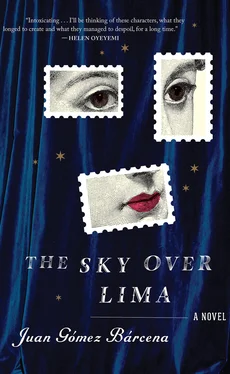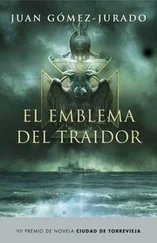That’s when he spots Sandoval. He’s going from bed to bed with concern on his face, checking on his comrades, murmuring a few words of encouragement. The doctors eye him reprovingly, but no one dares say anything. He looks like a father anxious about his children’s health, pacing back and forth with his hands behind his back and a solemn expression.
“Gálvez!” he says upon recognizing him. “Carlos Gálvez! What on earth are you doing here?”
Carlos — Rodríguez — hesitates a moment. No one has ever mixed up their last names before.
“Actually, I’m Rodríguez. It’s José who’s—”
“What goddamn difference does a last name make? Haven’t you learned anything?” he asks, making a grand gesture in the air, one that blots out genealogies, privileges, the past. “Oh dear, you’re injured! What have those butchers done to you?”
His voice sounds oddly tender. He draws near and examines the sutured wound. His eyes fill with pride. He takes off his hat and points to his own scar, also on the left side of his face, in almost exactly the same spot.
“Here’s my own baptism gift. A souvenir of the strike of ’99,” he says boastfully. “A soldier gave me this gift when I was about your age and I too was just beginning to engage in the struggle.”
“I’m not in the struggle. I just—”
“Of course, of course. You were just there by chance, right?”
Carlos begins babbling about Georgina, about letters that neither came nor went, but Sandoval interrupts him.
“Martín.”
“Pardon?”
“You don’t have to call me Sandoval. You can call me Martín,” says Martín.
Then, before Carlos can start explaining again, Martín places his hand on his shoulder and adds solemnly:
“And you don’t have to say anything. When our enemies bite the dust at last, we will remember sacrifices like yours. We will be able to sort out the wheat from the chaff. Those who were in the trenches from the beginning, and those who will have no place in the new order.”
“In 2014,” Carlos says, almost without thinking.
Martín scowls.
“Long before that! Why, today alone we have brought the eight-hour workday two or three years closer.”
He falls silent. Two beds away, a nurse is closing the eyes of the first martyr of the revolution. Martín clutches his hat to his chest.
“It’s a pity it’s already too late for our comrade Florencio,” he adds.
And he crosses himself, because it’s still 1905 and, according to his own calculations, God will not die for another sixty-four years.
◊
A little while later, José appears. He strides confidently up to the bed and hugs Carlos. It’s so wonderful to have found him! He’s spent hours going from hospital to hospital in El Callao. He felt so guilty when he saw him fall; he shouldn’t have left him to the mercy of those brutes, don’t think he hasn’t been telling himself that, but what else could he do? What would Carlos have done in his place? The same thing… the same thing, of course! But the worst is over. Can he walk? Then he’s coming with him right now and leaving this paupers’ hospital; there’s a carriage waiting for him outside.
And he hugs him again, because the most important thing is that everything has turned out all right; everything is forgiven. A sergeant, accompanied by several soldiers, comes to intercept them as Carlos is getting out of bed. He says he can’t let them leave, it’s impossible. There are procedures and protocols that can’t just be shrugged off; recent events have been quite serious, and statements must be taken from those involved. José sighs. He holds out a piece of paper that he has already prepared. The sergeant goes pallid when he sees the last name on the letterhead. He doesn’t even dare to read the full document. He returns it, awestruck, and tells the soldiers that it’s all been a misunderstanding, that the young men have been released and are free to go whenever they wish. With all due respect.
Carlos returns home at dusk. He’s almost all better; the aide has said all he needs is a little arnica and a change of bandage once a day. But his mother does not agree: their personal doctor must be called; Carlos must be kept awake in case of internal bleeding; the criminals who tried to kill her son must be reported to the police. She looks shaken and her eyes are red. She has been weeping and praying all day, ever since the driver informed her of the young man’s disappearance and they started searching for him in the jail, the morgue, the hospitals. For the first time in a long time, Carlos hears her shout, and with every shout she seems to become a little more real, filling in that years-long silence. His sisters emerge from their bedrooms and run down the stairs to kiss him, still wearing their nightgowns.
Don Augusto is fidgeting with a snuffed-out cigar. He’s anxious too, but he doesn’t chastise his son. It’s true that getting mixed up with agitators and terrorists was a numbskull thing to do, only Carlos would be capable of it, but in the end, weren’t we all young once? And at least the incident pushed Carlos into the fray for a bit of brawling — in short, made him act a bit manlier than usual, which, with regard to his son, is more reassuring than it is anything else. He’s not worried about the stitches either; he’s seen Indians still standing even with the white of their bones showing through their wounds. What’s more, the mark of the injury gives his son rather a determined look, a virility Don Augusto would never have thought possible and that he hopes is here to stay. Nevertheless, he accedes to his wife’s demands and orders his servants to fetch the doctor at once, even if they have to drag him out of bed.
And the doctor doesn’t find anything. Or, rather, he finds a clean bandage covering a few stitches — extraordinarily neat work, especially for a proletarian hospital, he thinks admiringly — and a small laceration that threatens no consequence more dire than staining the dressing a little. All he needs is a little arnica and a change of bandage once a day, and the doctor starts to say just that, but something in Señora Rodríguez’s eyes stops him. So he drags out the checkup a little longer and finally says that, come to think of it, better safe than sorry, so perhaps the boy should also rest a few days to recover from the shock and his injuries. He makes the suggestion without conviction; he’s very sleepy and wants to go home. Carlos’s mother desperately seizes on the idea. “The doctor said a week in bed!” she announces to her son after seeing the doctor to the door. Carlos says he feels perfectly fine, that he doesn’t need any rest, but in the end he gives in. Just as he allowed himself to be carried on the stretcher. Just as, eight years earlier, he endured those doses of liver-strengthening castor oil.
He spends the week in bed, and that week is enough time for a good many things to happen. He finds out about all of it through the papers, which his sisters sneak in to him on the breakfast tray (“And make sure you don’t read anything upsetting”).
The night of the riot, rocks shatter streetlights all over El Callao and Lima. The next day the people — but who or what is “the people,” really? — bury the martyr Florencio Aliaga in a grave paid for by the government. Someone writes a two-column editorial demanding that those responsible for the injured strikers be found, but even if anyone is responsible, nobody finds the culprit. Two days later the negotiations begin. At last the workers and the steamship companies reach an agreement establishing that everything will remain more or less the same, give or take a few soles . His mother’s prayers have been heeded once more, and the river of reality returns to its customary course, to what has always been and must always be.
Читать дальше












